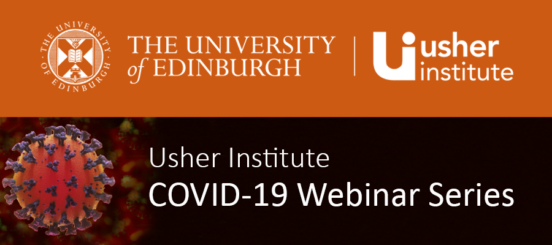The Usher Institute in the College of Medicine and Veterinary Medicine at the University of Edinburgh has been organising weekly webinars on COVID-19 since the early days of the pandemic. Leveraging networks of research institutions and professionals across different countries, the webinars were initiated as a tool to collaborate and exchange knowledge to inform policy and practice in Scotland. They were also aimed at the academic community in the UK and beyond.
The primary intention of the webinars was to learn from colleagues in other countries about how the pandemic was being addressed there. They would serve as a vehicle to share information with colleagues in government and public health agencies and to help with decision making, says Professor Linda Bauld, Bruce and John Usher Chair of Public Health in the Usher Institute. For example, following the first webinar, notes and slides were shared with the office of the Chief Medical Officer in Scotland regarding how Singapore deployed a multi-agency approach in their COVID-19 response.
The Usher Institute works with both policy and research communities in Scotland and internationally, with a focus on health informatics, data science and social science. They connect policy makers, practitioners, patients and publics to create, develop and share knowledge to improve health.
The webinar series was established by Professor Aziz Sheikh, Director of Usher Institute and Professor Bauld. The Webinars have proved very popular and have been attended by policy and practice colleagues from Scotland and other parts of the UK, along with researchers from a range of different countries in Asia, Africa, the Americas, Europe and the Pacific.
Experiences and evidence shared in real time during the webinars included not only new findings from researchers, but also description and analysis of how different countries and inter-governmental organisations are responding to the pandemic. Issues and concerns involving containment, mitigation and in some cases intended elimination of the virus have been covered in the Webinars. In addition, data on testing, contact tracing, treatment and public health responses were discussed.
Thirteen Webinars have been held to date. They have focused on:
- Practical lessons and insights regarding the prevention and treatment of COVID-19 from clinicians working in China during the early days of the outbreak;
- Deployment of measures involving a whole-of-government approach since January in Singapore;
- Experiences from Vietnam using a range of systems across the country, including health services, mass media, transportation and other elements to implement emergency control measures such as surveillance, contact tracing and quarantine;
- Experiences from Hong Kong on the implementation of border restrictions, quarantine and social distancing;
- Upscaling of ‘test, track, isolate and treat’ without a lockdown in South Korea, with the support of mobile test centers, credit card information for contact tracing and strong advocacy;
- Italy’s experience at the peak of the pandemic crisis and how different regions within the country were affected and responded
- Strategies New Zealand has implemented to move towards eliminating the virus within its borders;
- Experiences from Croatia including the use of social media to inform and engage the population;
- Multi-dimensional challenges and strategies low and middle income countries can deploy to respond to the pandemic, drawing on Nigeria’s experience;
- Risk factors for Covid-19 including emerging evidence on smoking and overweight and obesity; and
- Large scale, rapid research conducted by the International Severe Acute Respiratory and Emerging Infection Consortium.
Colleagues can join the Webinars by registering to participate using Zoom, or they can watch it live or on catch up via YouTube. Those joining via Zoom have an opportunity to pose questions to speakers and each Webinar has been followed by a useful discussion. The webinar series is contributing to identifying research gaps and connect those interested in similar topics. Some of the issues raised during the question and answer sessions have been actively followed-up, helping to build or strengthen partnerships and advance research collaboration. For example, following the webinar on ‘COVID-19 and obesity: risks, realities and research needs’ the organisers connected the speaker with the Non Communicable Diseases (NCD) Alliance, a network of more than 100 organizations globally whose priorities are to prevent and control NCDs.
“We are in a crisis, and the Webinars have further emphasized to me the urgent need for collaboration. We must work closely together and learn from one another to advance our collective knowledge in order to respond to this pandemic and beyond,” says Professor Bauld.
The next webinar is scheduled for 26th June, focusing on ‘Addressing COVID-19 in Latin America: How Brazil and Chile are responding to the pandemic’.
To access the slides and recordings please visit: https://www.ed.ac.uk/usher/news-events/covid-19-webinars
Aphaluck Bhatiasevi is a PhD student in Social Anthropology at the University of Edinburgh.










Comments by